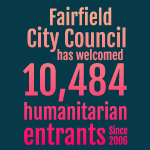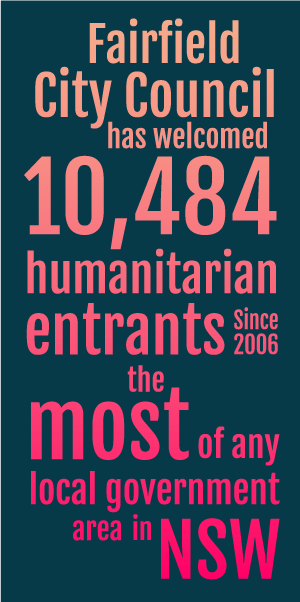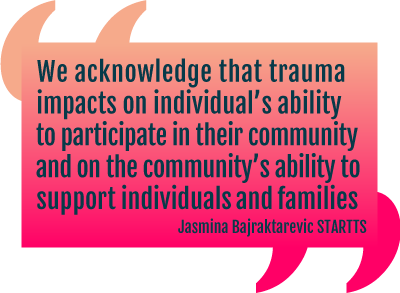Responding to refugees’ mental health needs in South-West Sydney

Fairfield is best known for its vibrancy and diversity of its residents, with a large proportion having a migrant background. Migrants have continually gravitated towards Fairfield for its long history of providing a home and a community for migrants. Since 2006, Fairfield City Council has welcomed 10,484 humanitarian entrants – the most of any local government area in NSW and almost double the number in Liverpool, according to the Settlement Reporting Facility of Department of Social Services.
In September 2015, the Australian government announced that it would resettle an additional 12,000 refugees in addition to the Refugee and Humanitarian Program, as a response to the global refugee crisis. It was estimated that about half of this special intake would be resettled in Fairfield, a suburb of about 18,000 people in the south-west of Sydney.

WayAhead spoke to Professor Newman about the challenges that refugees have experienced including trauma and trauma-related depression or stress when settling into the community, as well as the necessity for increased resources to respond to their needs.
“I have seen the whole spectrum of mental health issues displayed by refugees. I think they are very poorly understood and need more dedicated trauma-related mental health services because the impact of fleeing their homes for another country can be very damaging and long-term,” Professor Louise Newman explained.
Professor Newman has a background in child psychiatry, and worked with child refugees in south-western Sydney when she was conducting research around children and their mental health. She also worked with the Immigration Department Advisory Committee in 2013, working on reforms with the immigration policy amid growing concerns about offshore processing and detention centres.
“It is hard for refugees to reintegrate within society with these mental health issues. Some people come from certain countries and may not understand what mental health services are. They may not have had access to such support in their countries of origin but many refugees will accept mental health services if help is offered.”
Currently, all newly-arrived humanitarian entrants are eligible to receive initial, intensive settlement assistance through the Humanitarian Settlement Services (HSS) program in their first year of arrival. The services provided to help refugees settle in Australia generally include linking them to community programs to get assistance with finding accommodation and registering with schools, banks, Centrelink and other social services. When refugees show a need for mental health services, HSS may refer them to the Department of Health which offers the Programme of Assistance for Survivors of Torture and Trauma (PASTT) and NSW Services for the Treatment and Rehabilitation of Torture and Trauma Survivors (STARTTS).
STARTTS has a state-wide reach and provides a variety of services to refugees with a background of trauma. Their services include a balance of both community development activities and clinical approaches.
“We acknowledge that trauma impacts on individual’s ability to participate in their community and on the community’s ability to support individuals and families,” said Jasmina Bajraktarevic, the Community Services Coordinator of STARTTS. “We believe that intervention at any level of social system will have impact on the community level and will contribute to community strength.”

CORE Communities Services, a local organisation dedicated to refugee advocacy and policy work, assists refugees in navigating the Australian system including finding housing, employment, education and recreational activities to increase their social connections.
“I think there should be both investment in indirect and direct services addressing mental health for refugees. We plan activities to help refugees be more connected to the community, for example, excursions to different places of interest, like museums, or hold sporting activities that have great recreational benefits. These activities and outings have positive effects on refugees’ mental health as they are able to form social bonds and participate in the community,” explained Morlai Kamara, the Community Development and Policy Officer at CORE.
However, with the recent intake of resettlements, Fairfield is struggling to provide adequate resources for resettlement in such a short timeframe. “Indeed, [this is] five times our average annual settlement rate,” a spokesperson for Fairfield City Council said. “This translates into extraordinary pressure on the numerous community services and charities who are approached to help the new arrivals.”
“Immigration is a Federal Government responsibility and the settlement of refugees and migrants across the country is a national matter that requires open dialogue and action from the top tier of Australian government,” the Council said.
Demand for services is high with organisations having to expand to meet the need. Last year, STARTTS opened a new office in Fairfield in response to the growing demand for mental health services. In spite of increased pressures, the community in Fairfield remains open to resettling refugees and many non-government organisations continue to respond to their needs.
By Cindee Duong
Newsletter
Stay up to date
Sign up to our Mind Reader newsletter for monthly mental health news, information and updates.